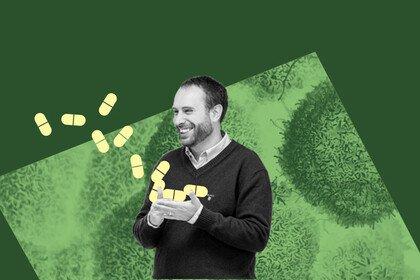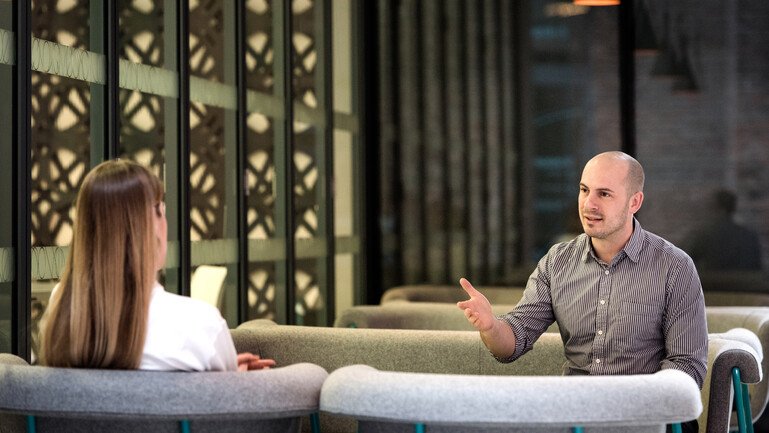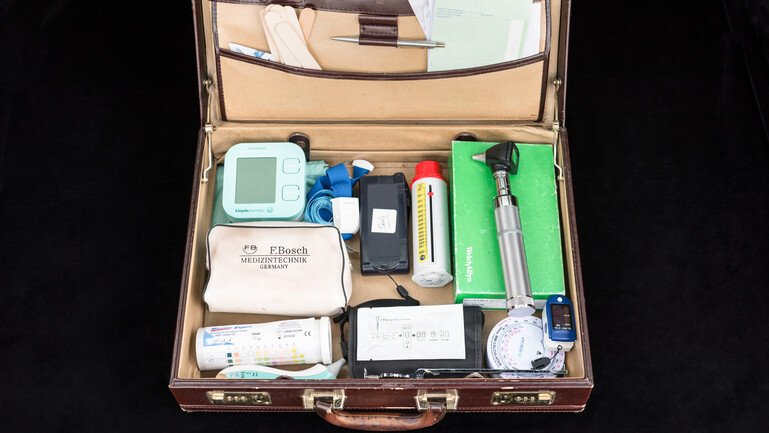
Ben's story: clinician, scientist and entrepreneur
Benjamin Brown is a general practitioner (GP) and a Wellcome Clinical Research Career Development Fellow at the University of Manchester. His research focuses on developing software that uses artificial intelligence and machine learning to improve primary care.
Ben Brown has always had a strong sense of what he wants to do, and that has guided the choices he’s made in his career. But as a clinician, he had to find ways to balance research with medical training and clinical practice.
From early in his medical training, Ben knew he wanted to do more than treat patients – he wanted to improve patient care.
"As a clinician you treat patients one-by-one. That’s key, and what I enjoy doing. But there was something else I was interested in, which was making changes on a larger scale," he says.

So he started searching for how he could do that. After his foundation training, he tried healthcare management.
"I did a fellowship in healthcare management because I wanted to see if this was another route to making organisation-level changes. I was inspired by doctors I met who were doing management work at regional level. And they were all GPs.
"I’d just done a placement in general practice before I started the fellowship and I liked it, so I thought this is something where I can combine doing the clinical work that I like with the ability to do management, take on leadership roles and effect change at a population level."
But he felt like something was missing. "I also wanted to do the science, the research," Ben says. "So I found a way of combining the academic rigour and clinical interest I had in general practice by doing an NIHR [National Institute for Health Research] Academic Clinical Fellowship."
This meant that for the next four years, while training to be a GP, Ben also did research. He’d become interested in health informatics during his healthcare management fellowship when he started a project to bring electronic records to nursing homes.
"That opened up my eyes to the benefits and opportunities to use digital health to help improve patients’ health and public health. So I focused my research on that."
Ben's career milestones
- 2007-2009
Foundation Training
Salford Royal NHS Foundation Trust
- 2009-2010
Clinical Leadership Fellow
NHS North West
- 2010-2012
MSc in Health and Public Leadership
University of Birmingham
- 2010-2014
National Institute for Health Research Academic Clinical Fellowship
University of Manchester
- 2010-2014
Membership of the Royal College of General Practitioners
- 2014-2017
PhD in Health Informatics (Wellcome PhD Training Fellowship for Clinicians)
University of Manchester
- 2018
National Institute for Health Research Academic Clinical Lecturer
University of Manchester
- 2019-present
Wellcome Clinical Research Career Development Fellowship
University of Manchester
Balancing clinical training with research
With the academic clinical fellowship, Ben began to lay the groundwork for his career as an academic GP.
First of all, being a good clinician was critical to him.
"For the kind of research I do – building software and trying to change practice – you have to be credible as a clinician to your clinical peers. You need to do day-to-day clinical practice to understand what it’s like and how your research can be most useful."
But in parallel to his GP training, clinical exams and keeping clinical portfolios, he had to make time to build up other skills in the background, that were essential for his research. Ben admits it was challenging, but he had a long-term plan in mind and was determined to make it happen.

He started by learning to code. His approach was to learn by doing, but with the help of his software engineer colleagues.
"You need someone who’s experienced, who has the time and is willing to look over your shoulder and give you feedback. And I was lucky to have those sorts of people around me at Manchester.
"It’s essential to find the right people to work with and the right mentors. You’re never going to solve the big problems on your own. No matter how good you are, you’ll always miss something."
Once he started to code, Ben focused on developing algorithms that could be applied to patient data and getting the preliminary results of his research published.
"I needed a foundation that could be built on during my PhD. It was about knowing what steps I had to go through, what options were available and planning in advance."
It was about knowing what steps I had to go through, what options were available and planning in advance.
And his plan worked. He was successful in getting doctoral fellowship offers from all three funders he applied to.
Ben chose Wellcome because he valued its independence and wider goal of improving population health through science, public engagement and the arts. "I thought there was a lot more freedom to do the kind of research I was interested in."
The software Ben developed during his PhD was to analyse electronic health record data. The results were then fed back to clinicians to highlight how they could improve patient care. "We went through various iterations and tested it in the lab before taking it out to GP practices. It’s now used in GP practices across Salford with plans to spread it across Manchester and beyond."
Looking for hard problems to solve
The next step was for him to develop the software further and release it on a larger scale.
He knew his work could have a big impact. "In primary care we see 90% of patient contacts. So just a small improvement can impact lots of patients because it’s on such a big scale.
"I applied for a Wellcome Clinical Research Career Development Fellowship (CRCDF) to see if we can use more advanced technologies, such as machine learning and direct messaging to patients by smartphone apps, to advance our knowledge of how we can use health data to improve population health."

Ben sees close parallels between his research and being an entrepreneur.
"As a researcher, you’re looking for gaps in knowledge, and as an entrepreneur you’re looking for gaps in the market. You’re always looking for these hard problems to solve which, if solved, can have positive impacts.
"You come up with lots of ideas and start sowing the seeds. Some will work and some won’t, but you’ve no way of knowing until you try."
Ben got the Wellcome Clinical Research Career Development Fellowship, but faced a problem shared by many clinician-researchers. "I think the difficulty for clinicians is what happens in between the funding, particularly at my level where you don’t have a permanent position at the university," he says.
If you’re left without an academic job, it means that not only do you lose your academic contract but your research goes on hold too.
"If you’re left without an academic job, it means that not only do you lose your academic contract, but your research goes on hold too."
So before starting the CRCDF, Ben took on a clinical lectureship at the University of Manchester. This allowed him to prepare the groundwork for his fellowship and to explore other research ideas.
He used this time to build partnerships with technology companies interested in solving similar problems – looking at how artificial intelligence and machine learning could be used to better effect in healthcare.
The work ahead excites him – but he knows that he’ll face the continuing challenge of juggling his two jobs.
"As a clinical academic, half your time is taken up doing clinical work. From a research point of view, you’re early in your career, you’ve just finished a PhD, so there’s still a lot of learning to do. Ideally, you need the resource to start building a team so that you can start addressing more of your research questions."
As a researcher, you’re looking for gaps in knowledge, and as an entrepreneur you’re looking for gaps in the market.
The Wellcome fellowship will allow him to do that. "At this level of award you’re not normally funded to have additional staff. But the panel considered my request for some technical support to help with my project.
"I think Wellcome understands that everybody’s individual, and projects are different. If you can justify why you need something extra, they’ll consider it. I don’t think many funders would necessarily do that."
Ben has now reached a point in his career where he sees research as his primary job. "When I work as a GP, I’m there as a GP – I’m helping patients and solving their problems. But this work is also material for me to identify issues in the care process that my research can address, and find ways that could potentially improve it."
Ben’s research vision was very well articulated in his application. He’s working in an exciting and fast-moving area, and this fellowship will allow him to create new opportunities to use data to improve primary care.


